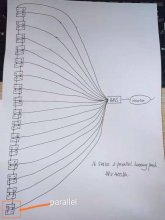Blahplunger
New Member
- Joined
- Jan 4, 2021
- Messages
- 6
Hi.I just purchased 32 12v 200 ah cells and have some questions.I plan to build a 48v 400 ah battery.In the future,I would like to add another 400ah for a total of 800 ah.Im worried that if I use these 32 cells for awhile,and then buy 32 more,that I will have issues,since they will have been in use for awhile,and have different resistance and capacity.Is there any way around this problem?What happens if Im unable to purchase the exact same cells?Can I use other cells of the same voltage and capacity from a different manufacturer?Here is the diagram that the manufacturer gave me for the 48v 400 ah battery.Should I make a different battery with the new cells I will purchase in the future,and then connect the two batteries together?Or can I just add them in and create one large battery,mixing used and new cells?I bought a BMS that is large enough to handle the 48v at 800ah.The cell manufacturer did tell me that it was recommended to make just one battery and not use two different batteries with different BMS.Thanks for the help.
Also,the manufacturer says they balance and match the cells.I will check them when I receive them.Do I need to do anything else before I begin building the battery?
Also,the manufacturer says they balance and match the cells.I will check them when I receive them.Do I need to do anything else before I begin building the battery?
Attachments
Last edited:





